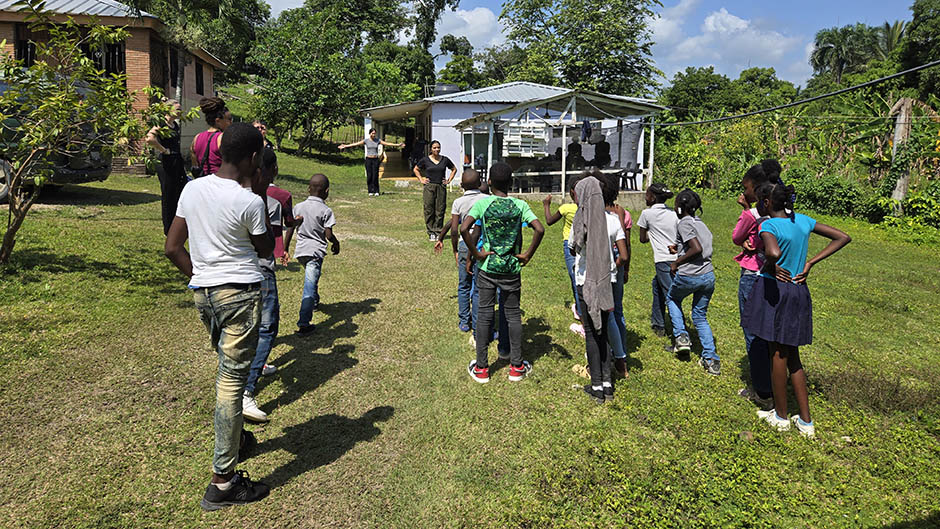The University of Miami Patti and Allan Herbert Business School’s primary conduit for student-generated pro bono work, the Hyperion Council, recently sent seven Council members to the Dominican Republic to educate young people about business.
Upon arriving in the Caribbean nation, the group journeyed to the northern city of Puerto Plata and met with 60 Haitian emigrants ranging in age from 8 to 15. The visit was partially facilitated by Peacework, a U.S. nonprofit focused on achieving equitable and sustainable development globally.
“Our mission is to apply the knowledge gained at Miami Herbert and to benefit underprivileged communities,” said Hyperion Council member Emily Struble, who participated in the Dominican Republic trip. “We do pro bono consulting with small businesses and help nonprofit organizations as well,” added Struble, who’s majoring in finance and will be starting her senior year this fall.
Struble was accompanied to the Dominican Republic by Hyperion Council members Claire Kim, Katie Melesko, Franchesca Ruiz, Harsh Shah, Daniella Sucre, and Rachel Yeung. The students traveled in tandem with Associate Professor of Professional Practice Esteban Petruzzello, the Hyperion Council’s faculty adviser.
Haiti and the Dominican Republic share the island of Hispaniola, a 29,418-square-mile Caribbean land mass where Haiti is situated to the west, the Dominican Republic to the east.
The young Haitians the Hyperion Council interacted with had moved east to the Dominican Republic with their families to escape the political and social turmoil in Haiti. Due to their uncertain political status, none of these Haitian children could enroll in Dominican schools.
Fortunately, the children are in regular contact with Project Esperanza, a charitable organization that serves the Haitian emigrant community in Puerto Plata, Dominican Republic. The Hyperion Council collaborated with this organization to support the children's needs.
“It’s very hard for them to get documented in any sort of way,” Struble recalled of the young Haitians, who the Hyperion Council met in a nontraditional setting–a farm where an outdoor classroom had been established, to include a whiteboard and chairs. “Most of them are undocumented and they can’t become citizens and they can’t go to school. We did workshops with them about basic financial literacy concepts.
“We taught them about how to make SMART (specific, measurable, achievable, relevant, time-bound) financial goals, how to have good ideas about saving and budgeting, basic concepts like that,” Struble said. “The children we worked with displayed an incredible sense of positivity and fortitude during this uncertain and challenging period of their lives.”
Professor Petruzzello said it was a bit challenging at times for the Hyperion Council students to communicate with the children, an effort occasionally filled the air with phrases in Spanish, Creole and English.
“All of the kids spoke Creole, and many of them spoke Spanish,” Petruzzello said, adding that a Project Esperanza representative was present to translate when needed. Petruzzello speaks Spanish, as did two Hyperion Council students who made the Dominican Republic journey.
“Those children were great, and were eager to learn,” Petruzzello recalled. “It was eye-opening how invested they were in our visit.”
The Hyperion Council’s visit to the Dominican Republic took place in mid-May, lasted from Monday through Sunday and was self-funded by the Miami Herbert organization, which has an endowment.
“In the Hyperion Council, our policy is that everyone has to go on at least one international trip before they graduate,” Stuble said. “I would definitely be willing to go again because of how much I really got out of this trip, and how much I enjoyed it.”

